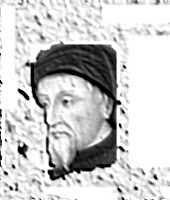Significant Historical Events of Chaucer's Era: The Hundred Years' War, The Black Death, The Peasants' Revolt, The Lollards' Movement, and the Language Revolutionized
The period from 1340-1400 is called the age of Chaucer. It was an age of transition. This transition implies a shift from medieval to the modern times. The most important events, of the time are: Hundred Year’s war, Black Death, Peasant’s Revolt, Lollards Movement, and Revolutionized Language.
The period between 1338 and 1453 is marked by Hundred Years’ War, a long succession of skirmishes and armed conflict between France and England. The War was a series of short conflicts, broken intermittently by a number of truces and peace treaties. It resulted from disputes between the ruling families of the two countries, the French Capetians and the English Plantagenets, over territories in France and the succession to the French throne. These battles were largely won by English Yeomen. These wars generated the feeling of patriotism and nationalism.
In the middle ages, people did not bother much about sanitation and cleanliness, so leprosy and other diseases which breed in dirt were very common. England was often visited by epidemics; especially plague . Black Death, outbreak of bubonic plague that struck Europe and the Mediterranean area during later half of the 14th century. The severest attack of this dreadful epidemic came in 1377. It was called the Black Death. The epidemic swept away of the total population of the England at that time and left the country totally disorganized price, rose and the value of money declined.
The suffering peasants of England became very restless and discontented. They revolts in 1381 because , the poll taxes imposed in 1377, 1379 and 1380 were oppressive , Watt Taylor, Jack Straw and John Bull led the peasants revolt .The mob stormed Landon, but Richard II handled the situation very cunningly and got the leaders arrested and then beheaded.
The medieval cleric was in Latin; very few people could understand what the priest was saying. Moreover, the clergyman had become corrupt undisciplined. John Wycliffe (1320-1384) was, the first Englishman to challenge the Catholic Church. He started what is called the Lollard’s movement .He translated the bible from Latin in to native tongue and sent his poor priest to all parts, of the country for spreading his message of simplicity causticity & purity .His movement was the beginning of reformation.
Latin and French were the dominant languages in the 14th century in England. However, in lateral half of 14th century English came to its own because of the great works done by Chaucer, Langland and Wycliffe, who wrote in English. Extending from 1066 to 1485, this period is noted for the extensive influence of French literature on native English forms and themes. From the Norman-French conquest of England in 1066 until the 14th century, French largely replaced English in ordinary literary composition, and Latin maintained its role as the language of learned works. By the 14th century, when English again became the chosen language of the ruling classes, it had lost much of the Old English inflectional system, had undergone certain sound changes, and had acquired the characteristic it still possesses of freely taking into the native stock numbers of foreign words, in this case French and Latin ones. Thus, the various dialects of Middle English spoken in the 14th century were similar to Modern English and can be read without great difficulty today. The Middle English literature of the 14th and 15th centuries is much more diversified than the previous Old English literature. A variety of French and even Italian elements influenced Middle English literature, especially in southern England. In addition, different regional styles were maintained, in literature and learning had not yet been centralized. For these reasons, as well as because of the vigorous and uneven growth of national life, the Middle English period contains a wealth of literary monuments not easily classified. The Vogue of romance was passing and the realistic poetry was taking roots. In a way, the age of Chaucer stands, between the medieval and the modern life. Compton-Rickett Observers, “Chaucer’s world is medieval; but beneath the medievalism, the heaven of the Renaissance is already at work.
A history of English literature : Buchan, John, 1875-1940 : Free Download, Borrow, and Streaming : Internet Archive. (n.d.). Internet Archive. https://archive.org/details/historyofenglish00buch
Full text of “A History Of English Literature Vol. 3 Ed.1st.” (n.d.). Full Text of “a History of English Literature Vol. 3 Ed.1st.” https://archive.org/stream/in.ernet.dli.2015.100288/2015.100288.A-History-Of-English-Literature-Vol-3--Ed1st_djvu.txt
An outline history of English literature : Hudson, William Henry, 1862-1918 : Free Download, Borrow, and Streaming : Internet Archive. (n.d.). Internet Archive. https://archive.org/details/outlinehistoryof00hudsuoft
A history of English literature : Compton-Rickett, Arthur, 1869-1937 : Free Download, Borrow, and Streaming : Internet Archive. (n.d.). Internet Archive. https://archive.org/details/historyofenglish00comprich


thanx.your blog inspired me to attempt net again after almost ten years.
ReplyDeleteThanks Varsha for your sweet words and best wishes for your coming endeavours.
ReplyDeletethank u vry much... this blog helped me a lot in my course of study.. I appreciate your endeavour of helping students,teachers and scholars all through the world....
ReplyDeletein books it says "Lollards Movement" but here is written Collard Movement
ReplyDeleteThanks for correction
Deletethis is insane. none has the simplest definitions as it's on your website
ReplyDeleteThanks a lot for ur work 💓
ReplyDelete